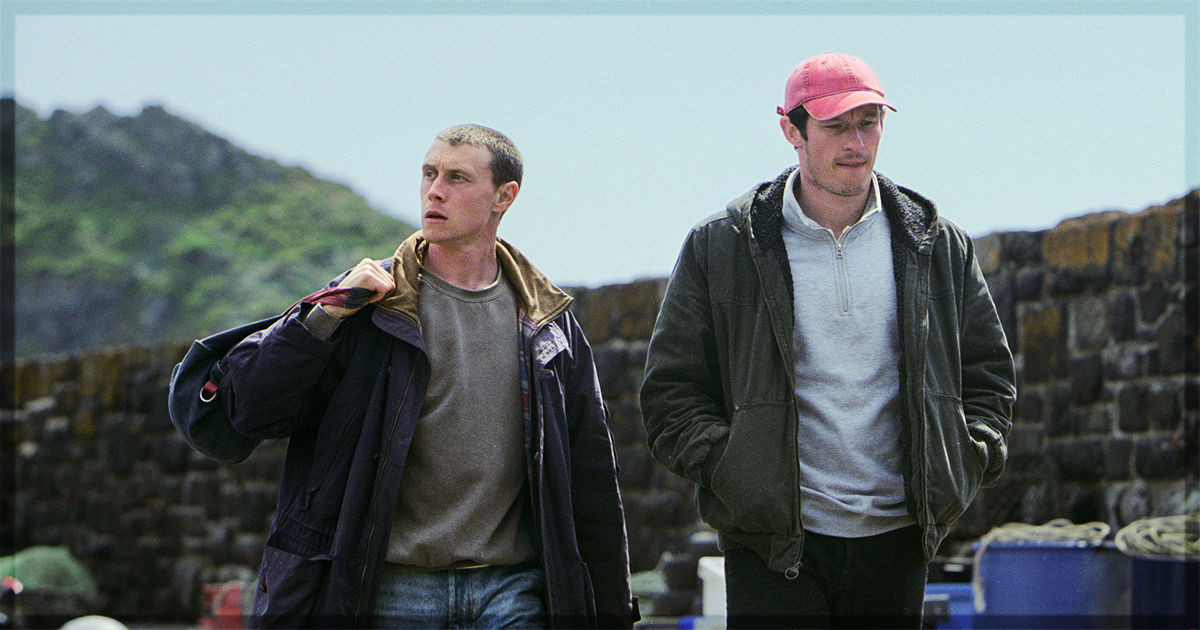Writer-director-cinematographer-editor-composer Mark Jenkin has an idiosyncratic vision for Rose of Nevada, not just in how many of the behind the camera jobs he does himself, but also in how his corner of England is portrayed onscreen. For Mr. Jenkin is not English but Cornish (and you better believe there’s a difference), interested in telling stories that are deeply connected to and focused on Cornwall’s past and present. Despite this his 2019 movie, Bait, got more attention for being filmed on a hand-cranked 16mm camera than for being a vicious culture clash between Cornish people who work on the sea and English people who are taking over Cornish towns to live by the sea. The follow up, Enys Men, was a disturbing horror movie both of great simplicity and enormous complexity, and filmed on a silent camera requiring all dialogue to be later dubbed. And now his new one, Rose of Nevada, has been more conventionally made, with two major British actors at its center, but with the sense of place and the everyday weirdness Mr. Jenkin specialises in entirely intact. It tells a complex and complicated story with the greatest of ease, and manages to be both utterly ordinary and entirely supernatural. Rose of Nevada is such a strange, moody surprise that it will haunt you, in the best way.
Nick (George MacKay) lives with his wife and small daughter in a crumbling old cottage; the family is happy but Nick has no work and a hole in the roof is a financial nightmare. The elderly married couple next door have never recovered from their son’s death at sea some 30 years previously. The boat he crewed, Rose of Nevada, was lost with all hands, but then one morning it reappears in the harbour, empty, ready, waiting. Everyone needs the work it can provide so no questions are asked. A captain (Francis Magee, who was a fisherman before training as an actor) is found by the owner Billy (Edward Rowe, who starred in Bait) and his partner Tina (Rosalind Eleazar) to take it out fishing again. Nick seizes the opportunity for a few days’ crew work with both hands, as does Liam (Callum Turner), a tall and attractive stranger who is given a red cap by a woman he flirts with in the pub, Tina’s younger daughter Jess (Yana Penrose). The three men go out for a few days, don’t talk much, slowly fill up the hull with boxes of their catch. The work is hard and dangerous, but also satisfying. But when they arrive back into the village it’s rapidly apparent something has changed. What it is should not be spoiled. The marketing has spoiled it. But not this review.
Instead we have a contrast between Nick, who loves his family and is proud of his responsibilities, and Liam, a drifter who skims through the surface of other people’s lives. These are not articulate men, and certainly not the kind of men who would talk about their feelings, but their body language speaks for them. As they both navigate the new world, the captain makes it clear the mystery is meaningless to him and whatever knowledge he has belongs to him alone. Suddenly it’s Liam who has a settled home with responsibilities and Nick who is unhappy and out of place. Nick is slightly more capable of speaking his thoughts, but the great trouble is no one around understands why they need to listen. And if they did listen, who would honestly believe him.
The supernatural elements here are all completely grounded in a certain kind of realism that this very specific fishing village setting can provide. In this milieu things are timeless, and also not. These are also not super sophisticated people, and strong backs eager for hard work fit perfectly in this type of setting. Mr. MacKay and Mr. Turner were clearly both thrilled to play this kind of part and both bring a rough, centered physicality that makes them look completely at home as they haul nets on the boat. Physical things like a love note, a nameplate or a message come and go in ways both believable and unbelievable, and the search for answers is both exceptionally important and kind of meaningless. Honestly it’s amazing that something can be both this simple and this complex. Its game of paradoxes combined with the stars should enable this to receive a fair amount of attention, which is only and entirely its due.
Why a working boat is named after a desert state six thousand miles away is never asked nor answered either, of course.
Rose of Nevada recently played at the London Film Festival.
Learn more about the film at the IMDB site for the title.


